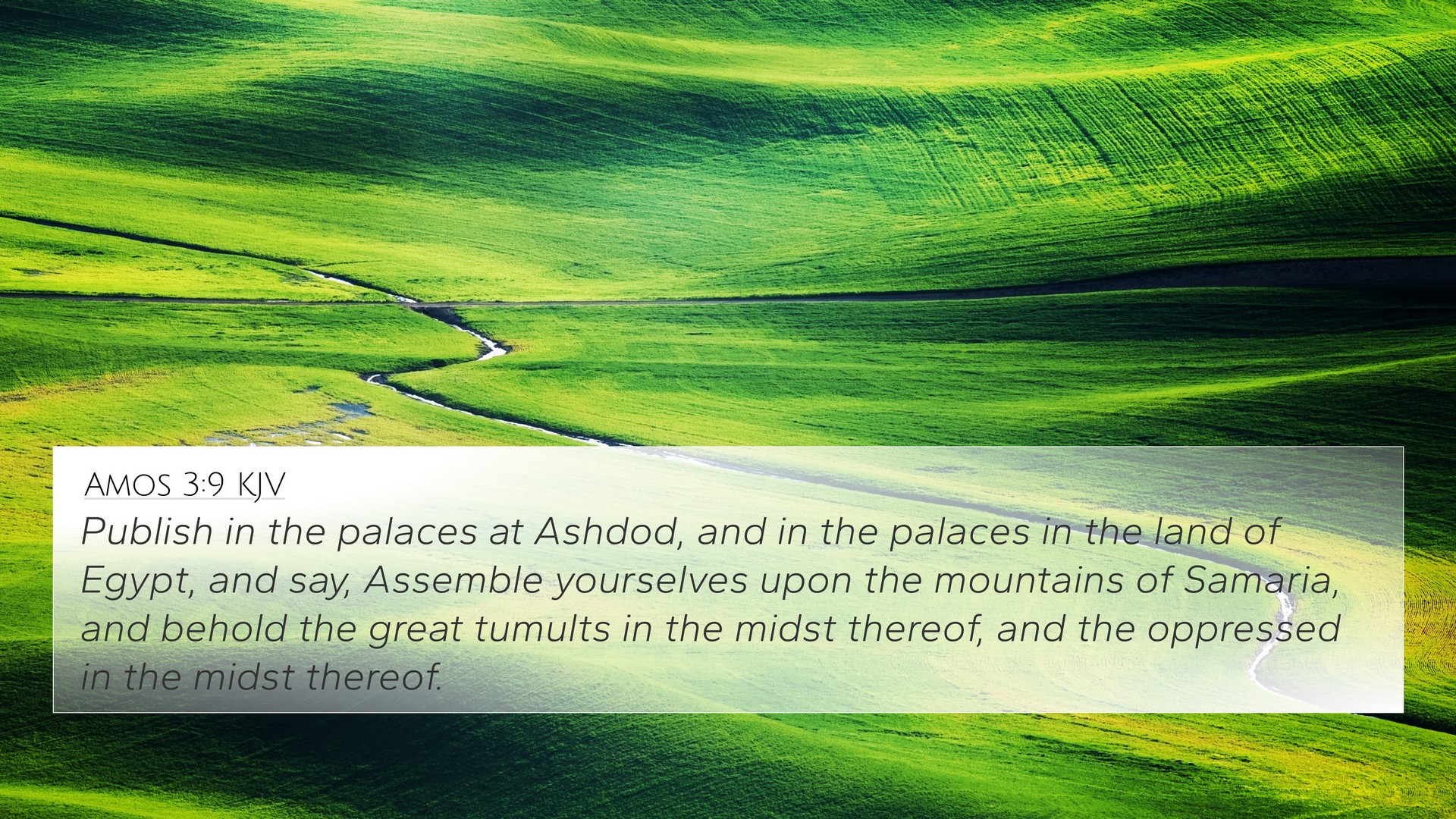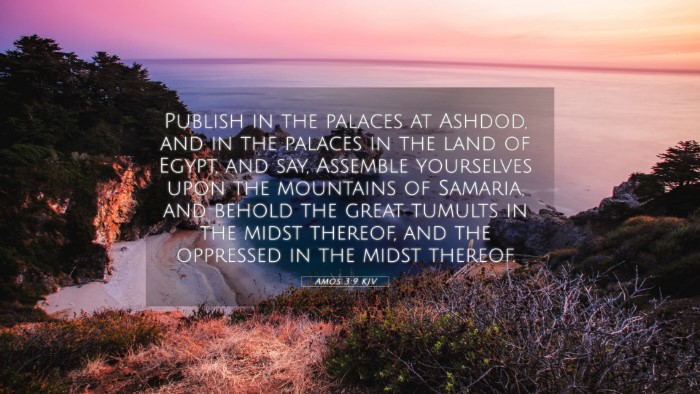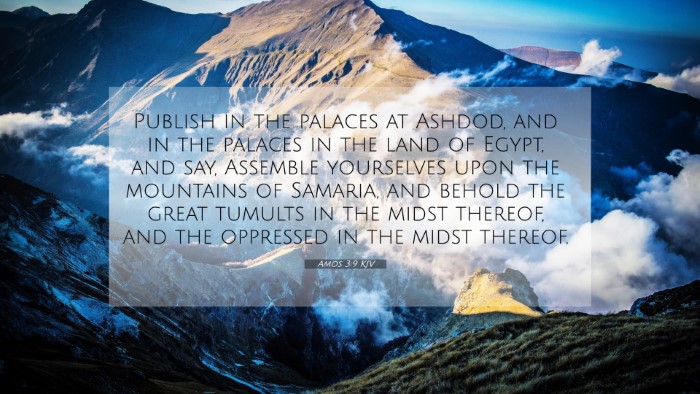Old Testament
Genesis Exodus Leviticus Numbers Deuteronomy Joshua Judges Ruth 1 Samuel 2 Samuel 1 Kings 2 Kings 1 Chronicles 2 Chronicles Ezra Nehemiah Esther Job Psalms Proverbs Ecclesiastes Song of Solomon Isaiah Jeremiah Lamentations Ezekiel Daniel Hosea Joel Amos Obadiah Jonah Micah Nahum Habakkuk Zephaniah Haggai Zechariah MalachiAmos 3:9 Similar Verses
Amos 3:9 Cross References
Publish in the palaces at Ashdod, and in the palaces in the land of Egypt, and say, Assemble yourselves upon the mountains of Samaria, and behold the great tumults in the midst thereof, and the oppressed in the midst thereof.
Uncover the Rich Themes and Topics of This Bible Verse
Listed below are the Bible themes associated with Amos 3:9. We invite you to explore each theme to gain deeper insights into the Scriptures.
Amos 3:9 Cross Reference Verses
This section features a detailed cross-reference designed to enrich your understanding of the Scriptures. Below, you will find carefully selected verses that echo the themes and teachings related to Amos 3:9 KJV. Click on any image to explore detailed analyses of related Bible verses and uncover deeper theological insights.
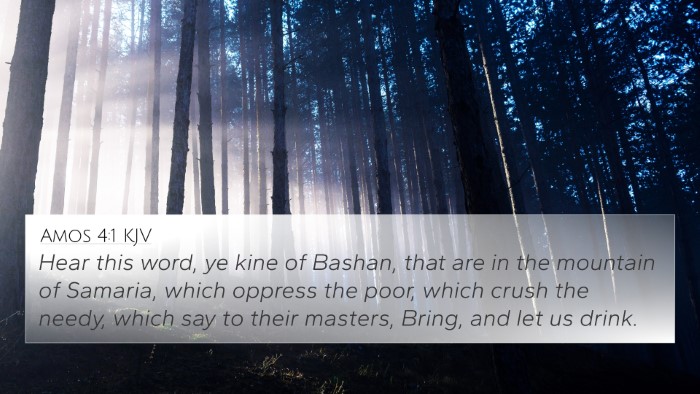
Amos 4:1 (KJV) »
Hear this word, ye kine of Bashan, that are in the mountain of Samaria, which oppress the poor, which crush the needy, which say to their masters, Bring, and let us drink.
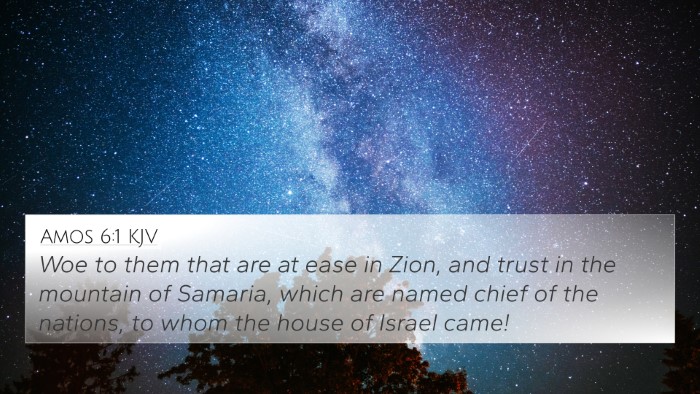
Amos 6:1 (KJV) »
Woe to them that are at ease in Zion, and trust in the mountain of Samaria, which are named chief of the nations, to whom the house of Israel came!
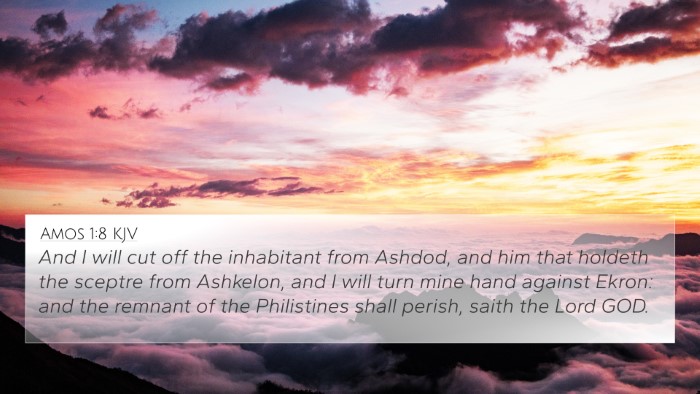
Amos 1:8 (KJV) »
And I will cut off the inhabitant from Ashdod, and him that holdeth the sceptre from Ashkelon, and I will turn mine hand against Ekron: and the remnant of the Philistines shall perish, saith the Lord GOD.
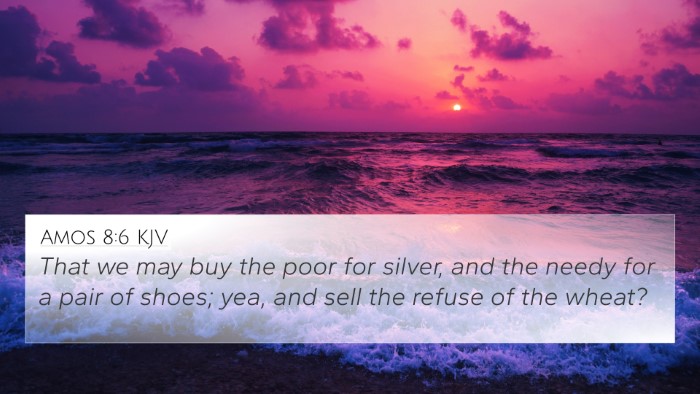
Amos 8:6 (KJV) »
That we may buy the poor for silver, and the needy for a pair of shoes; yea, and sell the refuse of the wheat?

Jeremiah 31:5 (KJV) »
Thou shalt yet plant vines upon the mountains of Samaria: the planters shall plant, and shall eat them as common things.
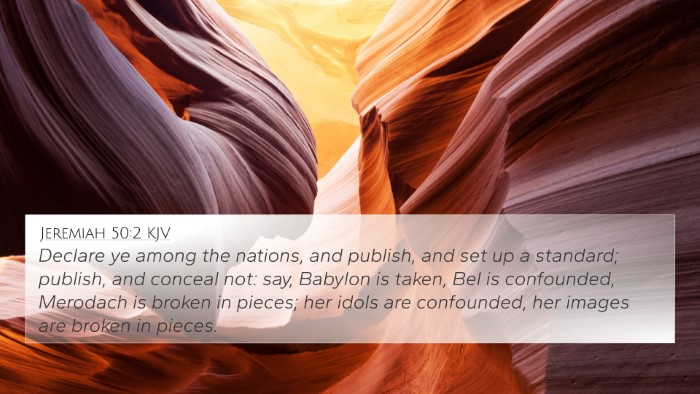
Jeremiah 50:2 (KJV) »
Declare ye among the nations, and publish, and set up a standard; publish, and conceal not: say, Babylon is taken, Bel is confounded, Merodach is broken in pieces; her idols are confounded, her images are broken in pieces.

1 Samuel 5:1 (KJV) »
And the Philistines took the ark of God, and brought it from Ebenezer unto Ashdod.
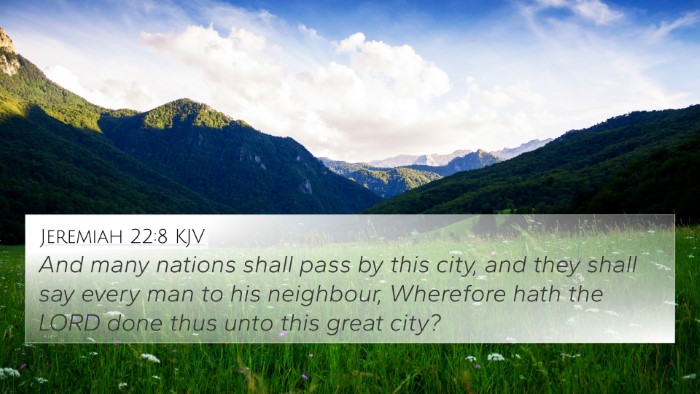
Jeremiah 22:8 (KJV) »
And many nations shall pass by this city, and they shall say every man to his neighbour, Wherefore hath the LORD done thus unto this great city?

Jeremiah 2:10 (KJV) »
For pass over the isles of Chittim, and see; and send unto Kedar, and consider diligently, and see if there be such a thing.
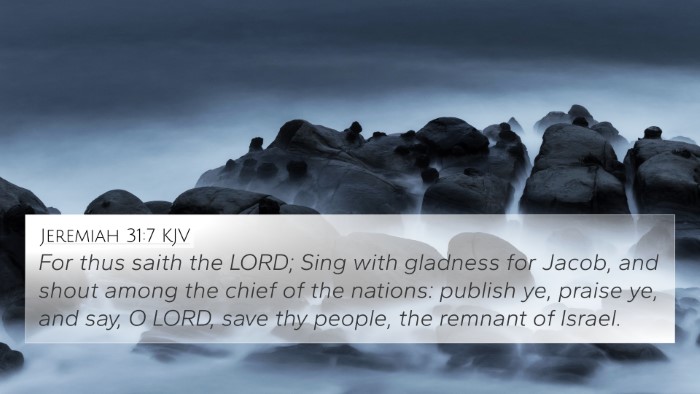
Jeremiah 31:7 (KJV) »
For thus saith the LORD; Sing with gladness for Jacob, and shout among the chief of the nations: publish ye, praise ye, and say, O LORD, save thy people, the remnant of Israel.
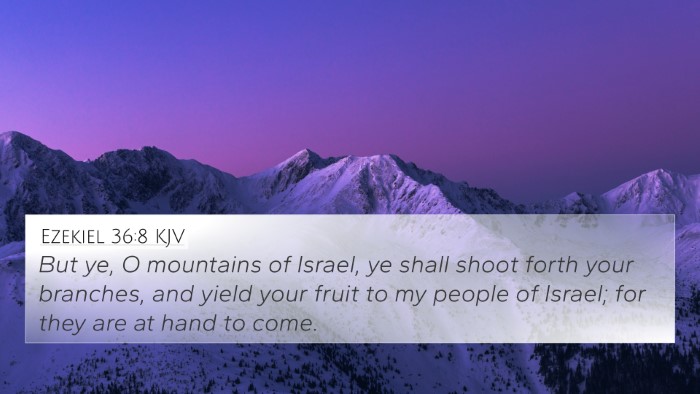
Ezekiel 36:8 (KJV) »
But ye, O mountains of Israel, ye shall shoot forth your branches, and yield your fruit to my people of Israel; for they are at hand to come.
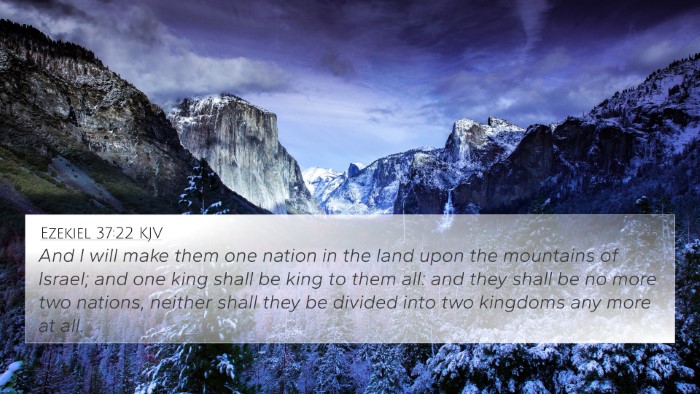
Ezekiel 37:22 (KJV) »
And I will make them one nation in the land upon the mountains of Israel; and one king shall be king to them all: and they shall be no more two nations, neither shall they be divided into two kingdoms any more at all.
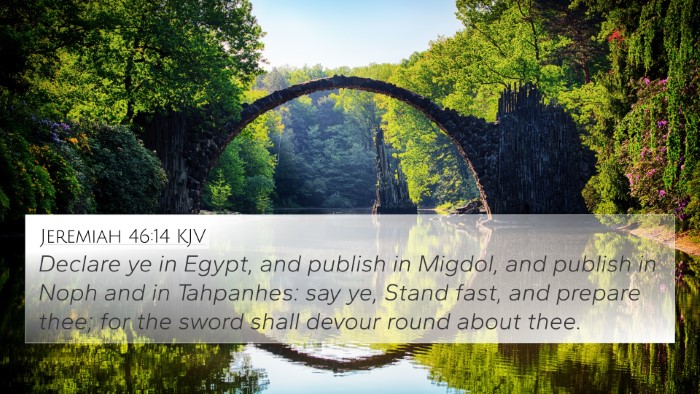
Jeremiah 46:14 (KJV) »
Declare ye in Egypt, and publish in Migdol, and publish in Noph and in Tahpanhes: say ye, Stand fast, and prepare thee; for the sword shall devour round about thee.
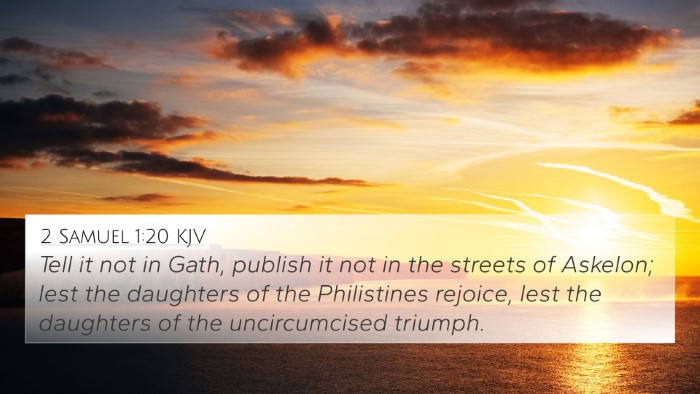
2 Samuel 1:20 (KJV) »
Tell it not in Gath, publish it not in the streets of Askelon; lest the daughters of the Philistines rejoice, lest the daughters of the uncircumcised triumph.
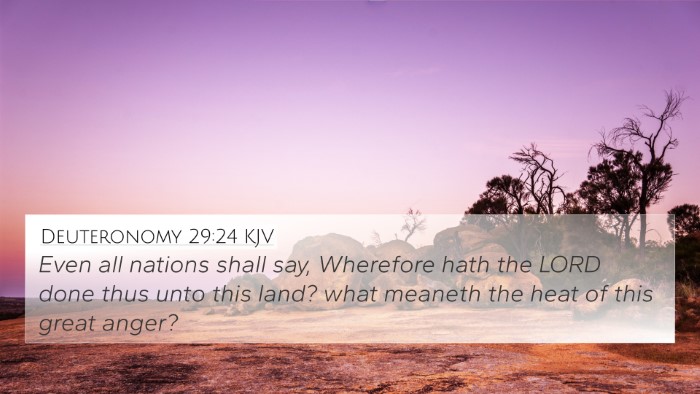
Deuteronomy 29:24 (KJV) »
Even all nations shall say, Wherefore hath the LORD done thus unto this land? what meaneth the heat of this great anger?
Amos 3:9 Verse Analysis and Similar Verses
Understanding Amos 3:9
Amos 3:9 states:
"Publish in the palaces at Ashdod, and in the palaces in the land of Egypt, and say, Assemble yourselves upon the mountains of Samaria, and behold the great tumults in the midst thereof, and the oppressed in the midst thereof."
This verse serves as a critical call to attention regarding the social and moral conditions of Israel before impending judgment. The prophet Amos emphasizes the urgent need for the nations surrounding Israel, particularly Ashdod and Egypt, to witness the chaos and oppression within the land.
Exegesis and Insights from Public Domain Commentaries
Matthew Henry's Commentary
Contextual Setup: Henry notes that Amos, as a prophet of God, is directed to publish the warning of judgment to significant political powers, illustrating the wide-reaching consequences of Israel's sin. His call to Ashdod and Egypt signifies that the plight of Israel is not a concealed affair but a public matter that impacts neighboring nations.
Observation on Oppression: Henry emphasizes the “great tumults” and oppression, representing both social and religious turmoil, something that other nations should observe and recognize as a warning. The moral decay of Israel serves as an example that transcends borders, underscoring God's justice and the inevitable consequences of neglecting His statutes.
Albert Barnes' Commentary
Exposition on Ashdod and Egypt: Barnes clarifies that Ashdod, a Philistine city, and Egypt, a symbol of opposition to Israel, were chosen to signify a greater audience. The call made to these cities is intended to highlight God's universal authority over all nations. He reflects on the idea that when God’s people are in a state of rebellion, it serves as a testimony to other nations regarding divine judgment.
Invitation to Witness: Barnes elaborates that God invites these nations to witness the “tumults” to awaken a sense of reality about God’s impending judgment. It is a reminder that neglecting God leads to chaos, and all nations should analyze Israel as a case of divine justice.
Adam Clarke's Commentary
Historical Background: Clarke provides a historical context of the oppression within Israel during Amos’ time. The social injustices and neglect of the poor called for divine intervention, and such a message could not be contained within Israel’s borders but was meant for all who would listen.
Link to Divine Expectation: Clarke points out the expectation of righteousness from a covenant people. The call to witness the suffering of the oppressed is a reminder of God’s demands for justice and mercy, compelling even foreign powers to take note of Israel’s failures.
Key Themes in Amos 3:9
- Divine Justice: The verse reflects God's justice that extends beyond Israel, making all nations accountable.
- Call to Observation: An invitation for external nations to recognize the signs of social upheaval.
- Oppression Awareness: The need for awareness of societal injustices that call for action.
- Warning of Impending Judgment: A reminder of the consequences of turning away from God.
Bible Cross References
Amos 3:9 can be linked to several other Bible verses that explore similar themes. Here are 10 pertinent cross-references:
- Isaiah 10:1-2: Addresses the plight of the oppressed and calls for divine justice.
- Jeremiah 22:3: Emphasizes justice and righteousness towards the needy.
- Micah 6:8: Highlights the requirements of God—justice, mercy, and humility.
- Ezekiel 22:29-30: Talks about corruption and God seeking someone to stand in the gap.
- Lamentations 3:34-36: Discusses God’s concern for justice and integrity.
- Proverbs 31:8-9: Calls for speaking up for those unable to speak for themselves.
- Zechariah 7:10: Urges society to administer true justice and show mercy and compassion.
- James 5:4: Condemns the exploitation and injustice faced by laborers.
- Matthew 24:7: Speaks about wars, famines, and injustices leading to judgments.
- Revelation 18:5: Indicates that sins of nations have reached up to heaven as a call for judgment.
Connections Between Bible Verses
This verse serves as a compelling example of how to connect various scriptures for thematic studies:
- Identifying Connections: To find cross-references in the Bible, it is essential to look at themes of justice and oppression across both the Old and New Testaments.
- Historical Contextualization: Understanding the historical background of the prophecies helps in linking these verses within their broader narrative frameworks.
- Practical Application: These connections help in applying biblical principles to contemporary issues of social justice and morality.
Conclusion
Amos 3:9 serves as a profound reminder of the moral and spiritual responsibilities of God's people. By utilizing tools for Bible cross-referencing, believers can deepen their understanding of God’s word and its implications for both personal conduct and societal structures. Through comparative Bible verse analysis and thematic connections, one can better grasp the holistic message of Scripture and its application to our modern world.
